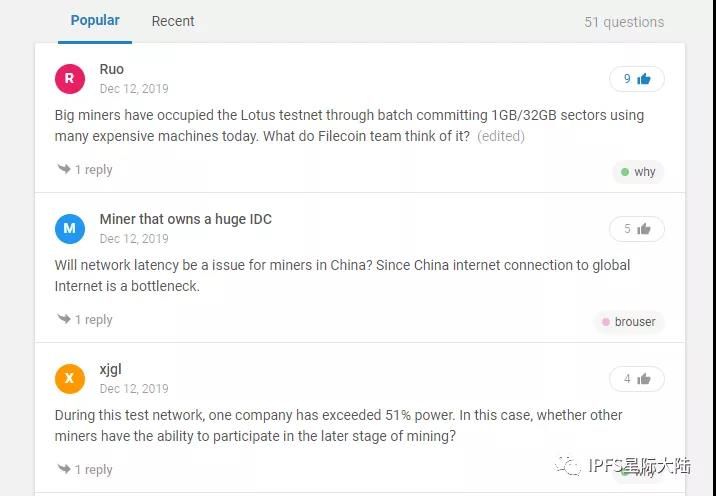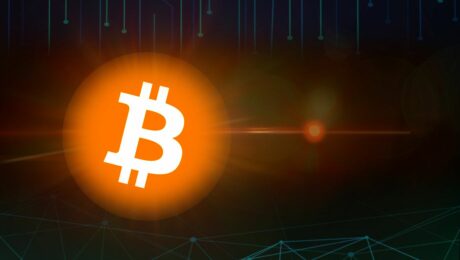Filecoin tests online, official team answers 22 questions from miners
Compilation: Interstellar Continent
Editor's Note: The original title was "Filecoin Testnet 22 Questions"
On December 12, 2019, the Filecoin official team and the miners conducted a two-hour interactive Q & A session on the testnet. The editor compiled 22 questions that everyone was concerned about, as follows: 
1 Q: Large miners use many expensive machines to occupy Lotus testnet by submitting 1GB / 32GB sectors in batches. What does the Filecoin team think about this?
- Highlights of the week review | Libra white paper quietly updated, central bank digital currency fever continues
- Xiao Lei: Why do the two central banks around the world propose to fight for digital currency leadership
- Xie Jianhui, Member of the Standing Committee of Hunan Provincial Party Committee: We must seize the opportunity to cultivate the development of blockchain and create new growth points
A: I think they have written custom mining software to participate in the network. It shows that we need to improve the built-in Lotus tools, and I also want to see many other organizations develop custom mining software soon!
2 Q: Will network delay become a problem for Chinese miners? Because China's Internet connection is the bottleneck of the global Internet?
A: We recommend using a lower latency network connection to submit PoSt on time. If miners fail to submit PoSt on time multiple times, it may result in winning fewer block rewards and increase the risk of being cut.
3 Q: In this test network, a company's power exceeds 51%. In this case, are other miners able to participate in the later stages of mining?
A: It looks like there are more companies ready for testnet launch than any other company. They have not shown this advantage, so new miners should be able to join and gain power. If they don't do well in the end (I really doubt they will), we may have to reset the network.
4 Q: Will mining the FIL become a GPU competition? Is the current top node because the GPU is more powerful?
Answer: Filecoin mining is not GPU mining. The Filecoin network rewards miners based on their computing power. Filecoin mining is based on the consensus of storage computing power: having more computing power (verified storage capacity) on the network is directly related to obtaining more block rewards. The computing power of a miner on the network is related to its storage capacity on the network, not directly proportional to the number of GPUs it runs. We also don't know what kind of hardware configuration the miners on the test network use. There can be multiple hardware configurations in the Filecoin testnet mining test.
5 Q: If the miner finds a mining algorithm, which strategy can contribute much more than the resources contributed by the testnet / mainnet, will it be feasible?
Answer: The security of this protocol is the first priority for Filecoin. Our protocol design and certification team has invested significant amounts of money to ensure the best way to earn mining rewards is to provide a large number of proven hard drives. We will continue this work to ensure that miners are always motivated to provide useful services to the network. If you find a great mining strategy, we would love to hear it on Slack!
6 Q: If I save the file in the miner, the corresponding sector has not been filled. How does this affect the retrieval of my files?
Answer: Because there are transactions on the chain, users can save files before the miner seals the files to the sector. Details can be found in the Filecoin Spec (https://github.com/filecoin-project/specs). Then, when miners are full of transactions, the department can be sealed, and users can retrieve files from the department in the future. Note that users can also retrieve their files immediately before sealing them to the sector. It's not implemented yet, but we plan to do it as soon as possible.
7 Q: It has been more than 12 hours since the testnet was launched. Why do only 4 miners remain on the list?
8 Question: In the latest roadmap, you said that the mainnet may be launched from March 23 to April 24, 2020. I would like to know what criteria you decide to launch it?
A: The most critical requirement for starting the Mainnet is that Filecoin is secure. We will not launch unsecured networks. The next requirement is performance and functionality. Currently, the launch window is our best estimate. As the distance approaches, the window size will shrink and we will be able to choose a date.
9 Q: Can we attract / host data storage needs from real-world projects during testing?
A: The network may experience a reset during the testnet. We do not recommend storing customer data or other data that needs to be stored very reliably before the mainnet.
10 Question: It seems that testnet is quite slow. What is your performance standard for testnet? And in what way can it be improved?
Answer: The software used for testnet has not been optimized for performance. Its focus is to ensure that everything is working properly and that the network performs its main functions. In terms of optimization, we still have a lot of work to do.
11 Q: Will we have the official wallet of Filecoin?
A: We are working with multiple hardware and software wallet projects and want reliable Filecoin wallet support before the mainnet launch.
12Q: For miners, the recommended hardware is a huge barrier to entry. Is the design decision worth considering, or you will not have a small home server and a home mining machine for NAS?
A: We are working to reduce seal and certification costs. We do want to support smaller miners, but not at the expense of safety. Later optimization can always make things faster and cheaper, but it is difficult to make things safer
13Q: Which is more important in mining, network latency and bandwidth?
A: Definitely make sure you have low latency (ideally less than 100 milliseconds to other major countries), but I recommend using at least 50 megabits of internet connection for bandwidth.
14Q: Is it reasonable to use "sealed workers" to cause unnecessary competition and make it difficult for ordinary miners to participate in the competition.
Answer: Sealers are used to distribute sealing work to different machines. Unless we can really reduce the cost of sealing, this will always be possible (although at some point you will maximize the write speed of your hard drive). We provide these tools to help miners compete fairly and they will write their own software version anyway.
15Q: Why is there no mining machine with only 32GiB power supply (this is the standard configuration in the tap) appear on the dashboard? How did those miners with more than 1TiB join?
A: Before the miners appeared in the power table, our minimum miner size was 512 GiB and we could get block rewards. You can use 512 GiB with 1GB or 32GB sectors. Miners smaller than 32GB will not be able to get block rewards, but can still accept storage transactions. Please note that these are parameters of the testnet and may be changed before the mainnet.
16Q: Is public IP always a requirement for mining Filecoin?
Answer: Yes, you need a public IP address, or you can have a separate computer with a public IP address that will relay the connection back to the internal computer. The requirement is that you must be dialable on libp2p.
Question 17: Will miners be penalized if they do not accept transactions that meet their latest asking price?
Answer: The transaction negotiation is completed off-chain, and miners will not be punished at the agreement level. However, services and platforms can be built on protocols, and there may be some penalties.
Q18: Should a miner prove that it has free storage space available?
A: This is actually part of the key economic mechanism we are considering for the agreement. The Filecoin specification lists some other mechanisms and parameters that may still change during the testnet, but must be resolved before the mainnet is launched
Q19: If the mainnet is 100, what is your score on the testnet?
Answer: 42
20Q: How much money can I earn as a miner?
A: After the mainnet is launched, when the actual Filecoin token is available, it will depend on many things, including how many others choose to mind and the extent and speed of adoption of Filecoin. We will post more information about the Filecoin cryptocurrency economic model in the first quarter, which may help you refine your calculations.
21Q: Is it possible to lose files?
A: No matter what type of storage provider you use, there is always a chance that your hard drive will fail or go offline. Today, centralized providers address this issue by storing multiple redundant copies of data. Filecoin can give you the control to do exactly the same thing in a truly decentralized way by copying data with multiple miners based on your cost and reliability preferences.
22Q: If GPU computing is not considered a centralization risk. Is it possible to create specific ASICs to efficiently calculate and centralize proofs?
Answer: Filecoin mining is not GPU mining. Filecoin rewards miners based on the proportion of storage they add to the network. Filecoin mining is based on storage capacity consensus: having more features on the network (verified storage) is directly related to winning more block rewards. The power of a miner on the network is related to the amount of storage that the miner places on the network, not the number of GPUs running on it. There are many different hardware configurations that can be used to mine the Filecoin testnet.
We will continue to update Blocking; if you have any questions or suggestions, please contact us!
Was this article helpful?
93 out of 132 found this helpful
Related articles
- Popular science | Liquidity mechanism of crypto derivatives
- Traditional finance may usher in the most bleak decade: Can it catalyze the spring of cryptocurrencies?
- Babbitt Exclusive | A quick glance at 6 practical cases, how do medical, energy, and financial fields combine blockchain?
- Interview with Babbitt | Luo Mei, Tsinghua University: Digital currency accounting and tax system is the infrastructure for blockchain to promote industrial upgrading
- The United States has issued a series of new data privacy regulations. Will this new wave affect the blockchain?
- Financial OneAccount is 40% off for listing in the US, is the second share of the blockchain worth looking forward to?
- Listen to the Filecoin team respond to the core questions you need to know about testing online






